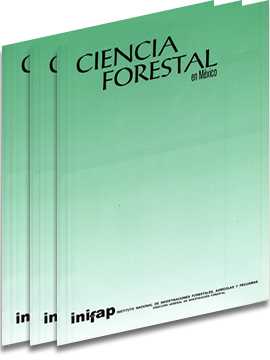ESTUDIO CARIOLÓGICO DE Quercus laurina Humb. & Bonpl.
Keywords:
Karyomorphology, karyotype, oak, Fagaceae, chromosome number, Quercus laurinaAbstract
Oaks (Quercus spp., Fagaceae) are the most important broad-leaved trees of Mexico temperate regions, due to their abundance. However, they have rarely been studied from the karyological point of view. Little information about the genus Quercus exists, which is based upon American and European species. In these studies, it is reported that 12 is the chromosome basic number and 2 the somatic chromosome number. The objective of this research project was to make a karyological analysis of Q. laurina for taxonomy purposes. Root tips were isolated from young seedlings, preserved in 30g/L paradichlorobenzene and xed on 6:1:1 (v:v:v) Carnoy’s solution. Carmin-acetic was used to stain. The squash technique with acetic acid was used. Chromosome study was determined for mitotic cells during metaphase. Q. laurina karyological study show a diploid species, a basic chromosome number of x = 12, a haploid complement of 37.2 μm, a centromeric index of 40.83 μm, and a intrachromosomal asymmetry index of 0.28 and a karyotype of 18 metacentric and six submetacentric chromosomes. Q. laurina karyomorphology is similar to other Quercus species.
Downloads
Downloads
Published
How to Cite
Issue
Section
License
The authors who publish in Revista Mexicana de Ciencias Forestales accept the following conditions:
In accordance with copyright laws, Revista Mexicana de Ciencias Forestales recognizes and respects the authors’ moral right and ownership of property rights which will be transferred to the journal for dissemination in open access.
All the texts published by Revista Mexicana de Ciencias Forestales –with no exception– are distributed under a Creative Commons License Attribution-NonCommercial 4.0 International (CC BY-NC 4.0), which allows third parties to use the publication as long as the work’s authorship and its first publication in this journal are mentioned
The author(s) can enter into independent and additional contractual agreements for the nonexclusive distribution of the version of the article published in Revista Mexicana de Ciencias Forestales (for example, include it into an institutional repository or publish it in a book) as long as it is clearly and explicitly indicated that the work was published for the first time in Revista Mexicana de Ciencias Forestales.
For all the above, the authors shall send the form of Letter-transfer of Property Rights for the first publication duly filled in and signed by the author(s). This form must be sent as a PDF file to: ciencia.forestal2@inifap.gob.mx
This work is licensed under a Creative Commons Attribution-Noncommercial 4.0 International license.


